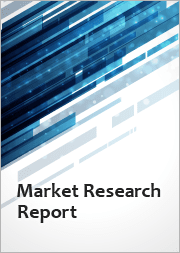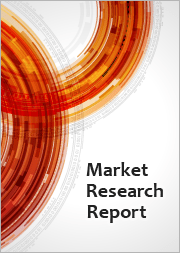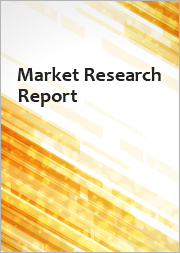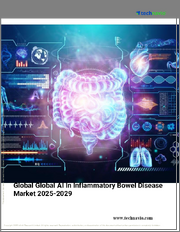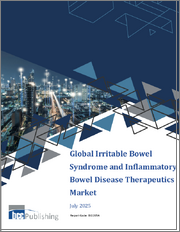
|
시장보고서
상품코드
1819974
과민성대장증후군(IBS) 치료 시장 보고서 : 유형, 제품, 유통 채널, 지역별(2025-2033년)Irritable Bowel Syndrome Treatment Market Report by Type (IBS with Diarrhea, IBS with Constipation, Mixed IBS), Product, Distribution Channel, and Region 2025-2033 |
||||||
세계 과민성대장증후군(IBS) 치료 시장 규모는 2024년 29억 달러에 달했습니다. 향후 IMARC Group은 시장이 2033년까지 57억 달러에 달하고, 2025-2033년 7.8%의 연평균 성장률(CAGR)을 보일 것으로 예측했습니다.
과민성대장증후군(IBS)은 대장에 영향을 미치는 만성 질환을 말합니다. 보통 심한 감염, 스트레스가 많은 생활습관, 장내 미생물의 변화, 장의 근육 수축, 신경계 이상에 의해 발생합니다. 가스, 설사, 경련, 복부 팽만감, 변비, 체중 감소, 구토, 복통, 삼킴 장애가 특징입니다. 현재 리팍시민, 로페라미드, 완하제, 진경제, 식이섬유 보충제, 코팅된 페퍼민트 오일 캡슐 등 IBS의 경미한 증상을 완화하는 여러 가지 약물이 판매되고 있습니다. 의사들은 또한 특정 환자를 치료하기 위해 프로바이오틱스, 인지행동치료(CBT), 장내 최면요법, 이완 훈련과 같은 정신 건강 요법을 권장하고 있습니다.
과민성대장증후군(IBS) 치료제 시장 동향 :
음식물 불내성 및 과민증, 소화관 내 세균 감염, 소장 세균의 과증식, 불안, 우울증, 신체적 증상과 같은 정신장애 등 IBS 질환의 위험을 높이는 요인은 여러 가지가 있습니다. 이는 진단 방법의 개선 및 헬스케어 서비스에 대한 쉬운 접근성과 함께 시장 성장을 가속하는 중요한 요인 중 하나입니다. 또한, IBS는 노년층에서 가장 흔한 기능성 위장 장애 중 하나입니다. 이에 따라 전 세계적으로 노인 인구가 증가하고 있으며, 이는 시장에 긍정적인 영향을 미치고 있습니다. 이 외에도 대변 미생물총 이식(FMT) 등 IBS 치료를 개선하기 위한 여러 임상시험이 진행되고 있으며, 이는 시장 성장에 기여하고 있습니다. 이와 더불어, 지속가능발전목표(SDGs)의 일환으로 각국 정부기관은 2030년까지 연구개발(R&D) 프로젝트와 연구자 수에 대한 지출을 대폭 늘리겠다고 약속하고 있습니다. 그 결과, 향후 IBS에 대한 잠재적인 치료 옵션의 수가 확대될 것으로 예측됩니다.
본 보고서에서 다룬 주요 질문
- 세계 과민성대장증후군(IBS) 치료제 시장은 지금까지 어떻게 성장해왔고, 앞으로 어떻게 성장할 것인가?
- 코로나19가 세계 과민성대장증후군(IBS) 치료제 시장에 미치는 영향은?
- 주요 지역 시장은?
- 유형별 시장 분석은?
- 제품별 시장 분석은?
- 유통 채널별 시장 현황은?
- 산업 가치사슬의 다양한 단계는?
- 업계의 주요 촉진요인과 과제는?
- 세계 과민성대장증후군(IBS) 치료제 시장의 구조와 주요 기업은?
- 업계 내 경쟁은 어느 정도인가?
목차
제1장 서문
제2장 조사 범위와 조사 방법
- 조사 목적
- 이해관계자
- 데이터 소스
- 1차 정보
- 2차 정보
- 시장 추정
- 보텀업 접근
- 톱다운 접근
- 조사 방법
제3장 주요 요약
제4장 서론
제5장 세계의 과민성대장증후군(IBS) 치료 시장
- 시장 개요
- 시장 실적
- COVID-19의 영향
- 시장 예측
제6장 시장 분석 : 유형별
- 설사를 수반하는 과민성대장증후군(IBS)(IBS-D)
- 변비를 수반하는 과민성대장증후군(IBS)(IBS-C)
- 혼합성 IBS
제7장 시장 분석 : 제품별
- Rifaximin
- Eluxadoline
- Lubiprostone
- Linaclotide
- 기타
제8장 시장 분석 : 유통 채널별
- 병원 약국
- 드럭스토어 및 약국
- 온라인 스토어
제9장 시장 분석 : 지역별
- 북미
- 미국
- 캐나다
- 아시아태평양
- 중국
- 일본
- 인도
- 한국
- 호주
- 인도네시아
- 기타
- 유럽
- 독일
- 프랑스
- 영국
- 이탈리아
- 스페인
- 러시아
- 기타
- 라틴아메리카
- 브라질
- 멕시코
- 기타
- 중동 및 아프리카
제10장 SWOT 분석
제11장 밸류체인 분석
제12장 Porter의 Five Forces 분석
제13장 가격 분석
제14장 경쟁 구도
- 시장 구조
- 주요 기업
- 주요 기업 개요
- Abbott Laboratories
- Allergan plc(AbbVie Inc.)
- Ardelyx Inc.
- Astellas Pharma Inc.
- AstraZeneca plc
- Bausch Health Companies Inc.
- GlaxoSmithKline Plc
- Novartis AG
- Sebela Pharmaceuticals Inc.
- Synthetic Biologics Inc.
- Takeda Pharmaceutical Company Limited
The global irritable bowel syndrome treatment market size reached USD 2.9 Billion in 2024. Looking forward, IMARC Group expects the market to reach USD 5.7 Billion by 2033, exhibiting a growth rate (CAGR) of 7.8% during 2025-2033.
Irritable bowel syndrome (IBS) refers to a chronic medical condition that affects the large intestine. It is usually caused by severe infection, stressful lifestyle, changes in gut microbes, muscle contractions in the intestine, and abnormalities in the nervous system. It can be characterized by gas, diarrhea, cramping, bloating, constipation, weight loss, vomiting, abdominal pain, and difficulty in swallowing. Several medications are currently available to relieve mild symptoms of IBS, including rifaximin, loperamide, laxatives, antispasmodics, fiber supplements, and coated peppermint oil capsules. Doctors also recommend probiotics and mental health therapies, such as cognitive behavioral-therapy (CBT), gut-directed hypnotherapy, and relaxation training, to treat certain patients.
Irritable Bowel Syndrome Treatment Market Trends:
Several factors increase the risk of IBS diseases, including food intolerances or sensitivities, bacterial infections in the digestive tract, small intestinal bacterial overgrowth, and mental disorders like anxiety, depression, and somatic symptom. This, along with improving diagnostic modalities and easy access to healthcare services, represents one of the key factors bolstering the growth of the market. Furthermore, IBS is one of the most common functional gastrointestinal disorders among the elderly. In confluence with this, the rising geriatric population across the globe is influencing the market positively. Besides this, several clinical trials, such as fecal microbiota transplantation (FMT), are being conducted to improve the treatment of IBS, which is contributing to market growth. In addition to this, as part of the Sustainable Development Goals (SDGs), governing agencies of various countries have pledged to substantially increase spending on research and development (R&D) projects and the number of researchers by 2030. This, in turn, is projected to expand the number of potential treatment options for IBS in the future.
Key Market Segmentation:
Breakup by Type:
- IBS with Diarrhea (IBS-D)
- IBS with Constipation (IBS-C)
- Mixed IBS
Breakup by Product:
- Rifaximin
- Eluxadoline
- Lubiprostone
- Linaclotide
- Others
Breakup by Distribution Channel:
- Hospitals Pharmacies
- Drug Stores and Retail Pharmacies
- Online Stores
Breakup by Region:
- North America
- United States
- Canada
- Asia-Pacific
- China
- Japan
- India
- South Korea
- Australia
- Indonesia
- Others
- Europe
- Germany
- France
- United Kingdom
- Italy
- Spain
- Russia
- Others
- Latin America
- Brazil
- Mexico
- Others
- Middle East and Africa
Competitive Landscape:
The competitive landscape of the industry has also been examined along with the profiles of the key players being Abbott Laboratories, Allergan plc (AbbVie Inc.), Ardelyx Inc., Astellas Pharma Inc., AstraZeneca plc, Bausch Health Companies Inc., GlaxoSmithKline Plc, Novartis AG, Sebela Pharmaceuticals Inc., Synthetic Biologics Inc. and Takeda Pharmaceutical Company Limited.
Key Questions Answered in This Report:
- How has the global irritable bowel syndrome treatment market performed so far and how will it perform in the coming years?
- What has been the impact of COVID-19 on the global irritable bowel syndrome treatment market?
- What are the key regional markets?
- What is the breakup of the market based on the type?
- What is the breakup of the market based on the product?
- What is the breakup of the market based on the distribution channel?
- What are the various stages in the value chain of the industry?
- What are the key driving factors and challenges in the industry?
- What is the structure of the global irritable bowel syndrome treatment market and who are the key players?
- What is the degree of competition in the industry?
Table of Contents
1 Preface
2 Scope and Methodology
- 2.1 Objectives of the Study
- 2.2 Stakeholders
- 2.3 Data Sources
- 2.3.1 Primary Sources
- 2.3.2 Secondary Sources
- 2.4 Market Estimation
- 2.4.1 Bottom-Up Approach
- 2.4.2 Top-Down Approach
- 2.5 Forecasting Methodology
3 Executive Summary
4 Introduction
- 4.1 Overview
- 4.2 Key Industry Trends
5 Global Irritable Bowel Syndrome Treatment Market
- 5.1 Market Overview
- 5.2 Market Performance
- 5.3 Impact of COVID-19
- 5.4 Market Forecast
6 Market Breakup by Type
- 6.1 IBS with Diarrhea (IBS-D)
- 6.1.1 Market Trends
- 6.1.2 Market Forecast
- 6.2 IBS with Constipation (IBS-C)
- 6.2.1 Market Trends
- 6.2.2 Market Forecast
- 6.3 Mixed IBS
- 6.3.1 Market Trends
- 6.3.2 Market Forecast
7 Market Breakup by Product
- 7.1 Rifaximin
- 7.1.1 Market Trends
- 7.1.2 Market Forecast
- 7.2 Eluxadoline
- 7.2.1 Market Trends
- 7.2.2 Market Forecast
- 7.3 Lubiprostone
- 7.3.1 Market Trends
- 7.3.2 Market Forecast
- 7.4 Linaclotide
- 7.4.1 Market Trends
- 7.4.2 Market Forecast
- 7.5 Others
- 7.5.1 Market Trends
- 7.5.2 Market Forecast
8 Market Breakup by Distribution Channel
- 8.1 Hospitals Pharmacies
- 8.1.1 Market Trends
- 8.1.2 Market Forecast
- 8.2 Drug Stores and Retail Pharmacies
- 8.2.1 Market Trends
- 8.2.2 Market Forecast
- 8.3 Online Stores
- 8.3.1 Market Trends
- 8.3.2 Market Forecast
9 Market Breakup by Region
- 9.1 North America
- 9.1.1 United States
- 9.1.1.1 Market Trends
- 9.1.1.2 Market Forecast
- 9.1.2 Canada
- 9.1.2.1 Market Trends
- 9.1.2.2 Market Forecast
- 9.1.1 United States
- 9.2 Asia-Pacific
- 9.2.1 China
- 9.2.1.1 Market Trends
- 9.2.1.2 Market Forecast
- 9.2.2 Japan
- 9.2.2.1 Market Trends
- 9.2.2.2 Market Forecast
- 9.2.3 India
- 9.2.3.1 Market Trends
- 9.2.3.2 Market Forecast
- 9.2.4 South Korea
- 9.2.4.1 Market Trends
- 9.2.4.2 Market Forecast
- 9.2.5 Australia
- 9.2.5.1 Market Trends
- 9.2.5.2 Market Forecast
- 9.2.6 Indonesia
- 9.2.6.1 Market Trends
- 9.2.6.2 Market Forecast
- 9.2.7 Others
- 9.2.7.1 Market Trends
- 9.2.7.2 Market Forecast
- 9.2.1 China
- 9.3 Europe
- 9.3.1 Germany
- 9.3.1.1 Market Trends
- 9.3.1.2 Market Forecast
- 9.3.2 France
- 9.3.2.1 Market Trends
- 9.3.2.2 Market Forecast
- 9.3.3 United Kingdom
- 9.3.3.1 Market Trends
- 9.3.3.2 Market Forecast
- 9.3.4 Italy
- 9.3.4.1 Market Trends
- 9.3.4.2 Market Forecast
- 9.3.5 Spain
- 9.3.5.1 Market Trends
- 9.3.5.2 Market Forecast
- 9.3.6 Russia
- 9.3.6.1 Market Trends
- 9.3.6.2 Market Forecast
- 9.3.7 Others
- 9.3.7.1 Market Trends
- 9.3.7.2 Market Forecast
- 9.3.1 Germany
- 9.4 Latin America
- 9.4.1 Brazil
- 9.4.1.1 Market Trends
- 9.4.1.2 Market Forecast
- 9.4.2 Mexico
- 9.4.2.1 Market Trends
- 9.4.2.2 Market Forecast
- 9.4.3 Others
- 9.4.3.1 Market Trends
- 9.4.3.2 Market Forecast
- 9.4.1 Brazil
- 9.5 Middle East and Africa
- 9.5.1 Market Trends
- 9.5.2 Market Breakup by Country
- 9.5.3 Market Forecast
10 SWOT Analysis
- 10.1 Overview
- 10.2 Strengths
- 10.3 Weaknesses
- 10.4 Opportunities
- 10.5 Threats
11 Value Chain Analysis
12 Porters Five Forces Analysis
- 12.1 Overview
- 12.2 Bargaining Power of Buyers
- 12.3 Bargaining Power of Suppliers
- 12.4 Degree of Competition
- 12.5 Threat of New Entrants
- 12.6 Threat of Substitutes
13 Price Analysis
14 Competitive Landscape
- 14.1 Market Structure
- 14.2 Key Players
- 14.3 Profiles of Key Players
- 14.3.1 Abbott Laboratories
- 14.3.1.1 Company Overview
- 14.3.1.2 Product Portfolio
- 14.3.1.3 Financials
- 14.3.1.4 SWOT Analysis
- 14.3.2 Allergan plc (AbbVie Inc.)
- 14.3.2.1 Company Overview
- 14.3.2.2 Product Portfolio
- 14.3.3 Ardelyx Inc.
- 14.3.3.1 Company Overview
- 14.3.3.2 Product Portfolio
- 14.3.3.3 Financials
- 14.3.4 Astellas Pharma Inc.
- 14.3.4.1 Company Overview
- 14.3.4.2 Product Portfolio
- 14.3.4.3 Financials
- 14.3.4.4 SWOT Analysis
- 14.3.5 AstraZeneca plc
- 14.3.5.1 Company Overview
- 14.3.5.2 Product Portfolio
- 14.3.5.3 Financials
- 14.3.5.4 SWOT Analysis
- 14.3.6 Bausch Health Companies Inc.
- 14.3.6.1 Company Overview
- 14.3.6.2 Product Portfolio
- 14.3.6.3 Financials
- 14.3.6.4 SWOT Analysis
- 14.3.7 GlaxoSmithKline Plc
- 14.3.7.1 Company Overview
- 14.3.7.2 Product Portfolio
- 14.3.7.3 Financials
- 14.3.7.4 SWOT Analysis
- 14.3.8 Novartis AG
- 14.3.8.1 Company Overview
- 14.3.8.2 Product Portfolio
- 14.3.8.3 Financials
- 14.3.8.4 SWOT Analysis
- 14.3.9 Sebela Pharmaceuticals Inc.
- 14.3.9.1 Company Overview
- 14.3.9.2 Product Portfolio
- 14.3.10 Synthetic Biologics Inc.
- 14.3.10.1 Company Overview
- 14.3.10.2 Product Portfolio
- 14.3.10.3 Financials
- 14.3.11 Takeda Pharmaceutical Company Limited
- 14.3.11.1 Company Overview
- 14.3.11.2 Product Portfolio
- 14.3.11.3 Financials
- 14.3.11.4 SWOT Analysis
- 14.3.1 Abbott Laboratories






